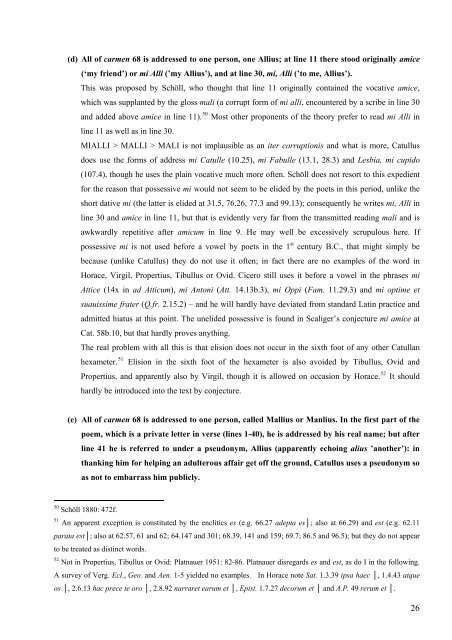CATULLUS 68 - Scuola Normale Superiore
CATULLUS 68 - Scuola Normale Superiore
CATULLUS 68 - Scuola Normale Superiore
Create successful ePaper yourself
Turn your PDF publications into a flip-book with our unique Google optimized e-Paper software.
(d) All of carmen <strong>68</strong> is addressed to one person, one Allius; at line 11 there stood originally amice<br />
(‘my friend’) or mi Alli (’my Allius’), and at line 30, mi, Alli (’to me, Allius’).<br />
This was proposed by Schöll, who thought that line 11 originally contained the vocative amice,<br />
which was supplanted by the gloss mali (a corrupt form of mi alli, encountered by a scribe in line 30<br />
and added above amice in line 11). 50 Most other proponents of the theory prefer to read mi Alli in<br />
line 11 as well as in line 30.<br />
MIALLI > MALLI > MALI is not implausible as an iter corruptionis and what is more, Catullus<br />
does use the forms of address mi Catulle (10.25), mi Fabulle (13.1, 28.3) and Lesbia, mi cupido<br />
(107.4), though he uses the plain vocative much more often. Schöll does not resort to this expedient<br />
for the reason that possessive mi would not seem to be elided by the poets in this period, unlike the<br />
short dative mi (the latter is elided at 31.5, 76.26, 77.3 and 99.13); consequently he writes mi, Alli in<br />
line 30 and amice in line 11, but that is evidently very far from the transmitted reading mali and is<br />
awkwardly repetitive after amicum in line 9. He may well be excessively scrupulous here. If<br />
possessive mi is not used before a vowel by poets in the 1 st century B.C., that might simply be<br />
because (unlike Catullus) they do not use it often; in fact there are no examples of the word in<br />
Horace, Virgil, Propertius, Tibullus or Ovid. Cicero still uses it before a vowel in the phrases mi<br />
Attice (14x in ad Atticum), mi Antoni (Att. 14.13b.3), mi Oppi (Fam. 11.29.3) and mi optime et<br />
suauissime frater (Q.fr. 2.15.2) – and he will hardly have deviated from standard Latin practice and<br />
admitted hiatus at this point. The unelided possessive is found in Scaliger’s conjecture mi amice at<br />
Cat. 58b.10, but that hardly proves anything.<br />
The real problem with all this is that elision does not occur in the sixth foot of any other Catullan<br />
hexameter. 51 Elision in the sixth foot of the hexameter is also avoided by Tibullus, Ovid and<br />
Propertius, and apparently also by Virgil, though it is allowed on occasion by Horace. 52 It should<br />
hardly be introduced into the text by conjecture.<br />
(e) All of carmen <strong>68</strong> is addressed to one person, called Mallius or Manlius. In the first part of the<br />
poem, which is a private letter in verse (lines 1-40), he is addressed by his real name; but after<br />
line 41 he is referred to under a pseudonym, Allius (apparently echoing alius ’another’): in<br />
thanking him for helping an adulterous affair get off the ground, Catullus uses a pseudonym so<br />
as not to embarrass him publicly.<br />
50<br />
Schöll 1880: 472f.<br />
51<br />
An apparent exception is constituted by the enclitics es (e.g. 66.27 adepta es│; also at 66.29) and est (e.g. 62.11<br />
parata est│; also at 62.57, 61 and 62; 64.147 and 301; <strong>68</strong>.39, 141 and 159; 69.7; 86.5 and 96.5); but they do not appear<br />
to be treated as distinct words.<br />
52<br />
Not in Propertius, Tibullus or Ovid: Platnauer 1951: 82-86. Platnauer disregards es and est, as do I in the following.<br />
A survey of Verg. Ecl., Geo. and Aen. 1-5 yielded no examples. In Horace note Sat. 1.3.39 ipsa haec │, 1.4.43 atque<br />
os │, 2.6.13 hac prece te oro │, 2.8.92 narraret earum et │, Epist. 1.7.27 decorum et │ and A.P. 49 rerum et │.<br />
26






